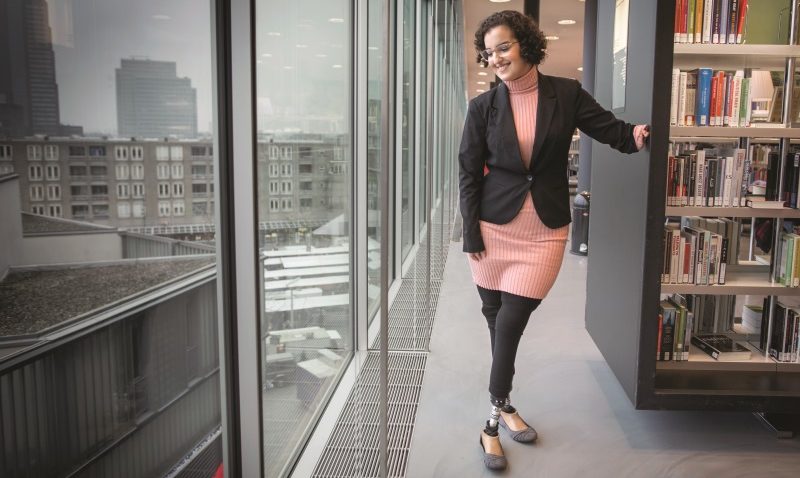Third year student Romana was born with under developed limbs. Three years ago she chose to have her feet removed. While she was starting an intense revalidation process and going through a grieving process, she also started her education here at Windesheim.
Her Instagram name is @Bionic_Romana_23, in her bio she describes herself as ‘amputee girl’. She shares light-hearted, positive pictures of her daily life, for example in the gym, bar or a restaurant, but also of her artificial body parts. Third year student Finance & Control Romana Bougottaya knows what she wants and who she is. She has had to fight very hard to get there.
No fibulae
The Amsterdam based woman was born with ‘reduction-defect’ 23 years ago. Her limbs were not fully developed during the pregnancy. Because of that, she has a shorter left arm, she misses a few fingers on her right hand and her feet were deviant. ‘I have no fibulae, barely any knee ligaments, and I had shoe size 32.’ Says Romana. ‘My feet were in a state of permanent plantar flexion I was suffering from clubfoot. Walking was not easy. I had artificial legs which I could use with my own feet, but they were very heavy and had top parts to support my knees. After a while, walking became so difficult that I ended up in a wheelchair most of the time.
Grieving process
Almost three years ago Romana decided to have her feet amputated. ‘I wanted to work-out again and do other activities that are very normal for other young women. Dancing for example. After the amputation I would be able to wear normal artificial legs, so I would be able to do way more.’
A few months before the start of her first year at Windesheim Flevoland she had the surgery. ‘That was hard. When I woke up from the surgery I thought I still had my feet. It was quite a shock to discover that they were gone. Even though I had made this decision for myself, I still ended up going through a grieving process. It felt as if I had lost a loved one. It was a tough time, physically and mentally. Walking for the first time was extremely painful and exciting, because how was it going to continue? I was in the middle of processing, revalidating in Utrecht, travelling to Almere for classes daily, studied hard and had to deal with wounds that didn’t want to heal. It was hard, but I don’t regret it. I gave away a piece of my body and I received a life in return.
Insatiable fighting spirit
Romana had developed an insatiable fighting spirit. ‘I didn’t want to just feel down and I have worked very hard. I passed my first year in time and I didn’t have any backlog.’ Romana started at MBO level. After this HBO course she intends to attend University to get her master’s degree. ‘I know the way I want to go, which is forward.’ She’d received a lot of support from her classmates, teachers and the dean. ‘The first weeks I was still in a wheelchair. Everyone reacted in a cool manner. Classmates grabbed my books for me and were very understanding if I wasn’t able to be there for a project. Very comforting. It probably helps that I don’t care what people think of my disability and that I radiate that vibe as well.’
Born this way
Romana has two tattoos. ‘When I was eighteen I had ‘Born this way’ tattooed on my shoulder. I was born with a disability and I have never had any issues with that. After my surgery I had the text ‘never give up’ tattooed on the back of my shoulder. Because of me not giving up I can walk straight up and even go long distances. Besides that, I have learnt how to ride a bike, which I couldn’t before because of the heavy artificial legs that I had back then. I am so happy with it! Sometimes I cycle to school just because I now can. Besides that I play basketball, I work out and I dance! When I was able to walk for the very first time I felt so much freedom. Awesome!
Walking on fire
With her Instagram account she hopes to inspire others. ‘When I was in a wheelchair people never asked me what I wanted to drink, but they asked the people I was with instead. Then I would say: ‘you can ask me as well, you know.’ It’s annoying when some people think you can’t do anything yourself. I want to show that, as a person with a disability, you can also go to university. It doesn’t matter if you’re disabled. ‘That’s the way you’re perfect.’ I am happy the way I am. Of course my disability has negative sides to it as well, but I like to think: who can decorate their legs with glitters and walk around with that for years?! Sometimes I say: ‘I can walk on fire!’
Tessa Klooster
